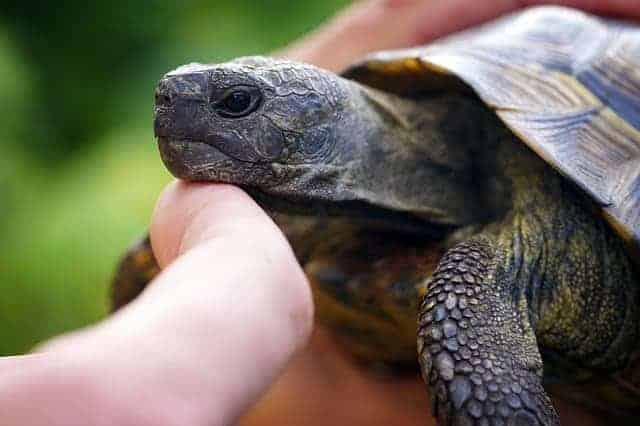
As great as they are, tortoises aren’t really known for being affectionate creatures. For one thing a large part of their anatomy is made up of a hard shell, hardly the cuddliest thing in the world.
If you’re a tortoise owner however, it won’t take long before you know different. The ‘emotional’ responses you get from a tortoise are subtle, but if you know what to look for, you’ll soon know if your tortoise is responding to you in a positive way or not.
Indeed tortoises can be ’emotional support’ pets just like other pets.
Tortoise’s Are Not Cats or Dogs… Obviously
The trouble is that as a society we’ve been conditioned to expect the same sort of emotional responses from out pets as we do other people. Cats and dogs are readily treated with the same (or even greater) level of affection to people, so many people aren’t prepared to take the time to invest in bonding with more unusual creatures such a tortoises, which is a great shame!

Being reptiles, tortoises are harder to read, but make no mistake there’s an emotional response going on in their brain as a result of every bit of environmental stimulus they experience, just as their is for any other creature.
A Tortoise’s Response to Touch
Just like cats and dogs, tortoises respond to being touched. If you touch a tortoise in a way he or she likes, for example by giving their neck a gentle scratch, they will respond either by simply allowing you to continue, or by extending their neck further, and even closing their eyes whilst allowing you to continue. If on the other hand they don’t like what you’re doing they’ll retreat into their shell, or maybe even try to bite you!
Whilst you might not think a tortoise can feel anything through their shell, this isn’t actually the case. The shell isn’t just a benign lump they happen to carry around on their backs, it’s very much a living part of their anatomy. Therefore just touching the shell can initiate an emotional response from your tortoise, and in fact this is a really good place to start, because whilst they can feel it, the sensation isn’t as strong as if you touch their skin so it’s less likely to be overstimulating.
If you’ve had your tortoise more or less since birth, then provided you’ve done a good job of looking after them, they won’t be anywhere near as nervous of interacting with people as a tortoise that’s experienced trauma in its life.
If you’re just starting out as a tortoise owner, or haven’t ventured into the touchy feely realm with your tortoise before, I would still start out with a gentle shell rub every day before you can expect to be able to move onto being able to give their chin or neck a rub.
A Tortoise’s Visual Response to Their Owner
Whilst there isn’t a lot of data available to establish just how good a tortoise’s eyesight is, it’s probably fair to say that it isn’t strong enough to be able to recognise much in the way of detail.
Having their eyes on the sides of their heads means that tortoises are able to sense visual stimulus in a wider field of view to us, but it’s more than likely this is to pick up movement rather than look at anything in great detail.
So if you were hoping for your tortoise to be able to recognise your smiling face, sorry to disappoint but this is almost certainly an impossibility!
A Tortoise’s Response to Voice
I can’t really comment on this personally as I’ve yet to succeed with my efforts, however there are many tortoises who do indeed respond to the sound of their owners voices, and in some cases can even be summoned by calling their name!
Of course far from being remarkable, this is essentially the same mechanism as found in other animals. If the ‘food provider’ sounds a certain way, then it’s worth knowing what they sound like and playing along with their game! A cynical view perhaps, but it’s probably true.
Regardless of whether it’s just because you supply their food or is really a sign of genuine affection is largely irrelevant in my opinion. If you benefit from a more fulfilling relationship with your tortoise by talking to him or her, and she begins to respond positively to you, then that can only be a good thing.
I’ve even heard some owners say their tortoise will even move in a certain way when they’re sung to!
A Cunning use of Tools
Not necessarily indicative of a bond with their owner, but the breeder who I bought my tortoise from told me that her two spur thigh tortoises (who had free reign of her garden and kitchen) are able to indicate their hunger by tapping their beaks against her fridge door.
This gives you an indication of how intelligent tortoises can be, which shows just how capable they are of having more of a relationship with you than you might first think
A Great Companion
As we all know tortoises are long lived creatures, and in many cases you can expect a well cared for specimen to live for as long as, if not longer than you.
I’ve found this to be a pretty powerful fact in itself, imagine all the experiences we go through in life and the few things that remain constant. If you’ve got a tortoise that’s been with you through thick and thin for decades, you’re going to feel a bond with it no matter what.
Not only this, but I personally find something reassuring about living alongside a creature whose ancestry stretches back 200 million years, dwarfing our 100 thousand. It’s like caring for a living piece of history!



